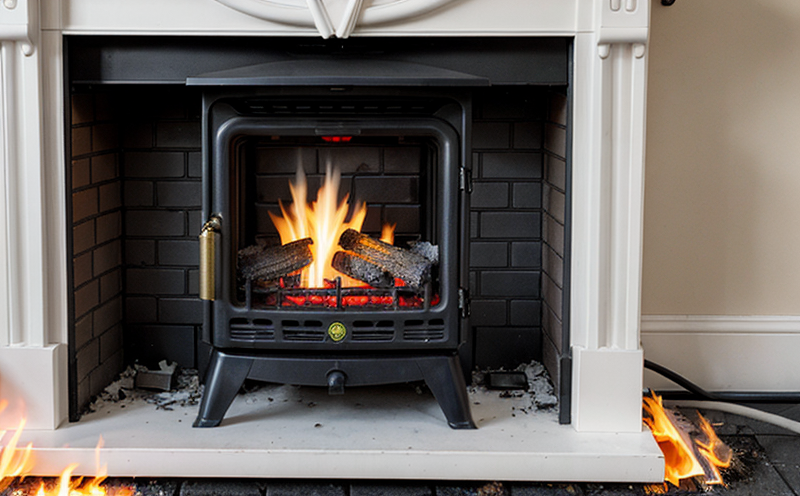ISO 6940 Fabric flammability determination Surface ignition test
The ISO 6940 surface ignition test is a critical component of fabric flammability analysis, designed to determine the minimum temperature at which a specimen will ignite under controlled conditions. This test is particularly important for textiles that are intended for use in environments where fire safety is paramount, such as clothing, upholstery, and industrial protective gear.
The procedure involves placing a specified specimen on a flat surface within a chamber maintained at 23°C ± 2°C (73°F ± 4°F) with a relative humidity of 50% ± 10%. The specimen is positioned horizontally or vertically depending on the orientation required for the test. A controlled flame, typically a Bunsen burner, is used to ignite the material at its surface.
The testing apparatus includes a chamber that can be sealed and regulated for temperature and humidity, along with a flame source capable of delivering consistent heat. The specimen must meet certain dimensions as specified in ISO 6940, ensuring consistency across tests. The test requires precise control over environmental conditions to ensure accurate results.
The surface ignition test is essential for compliance with international standards such as ASTM D6473 and EN 13534-2. It provides a standardized method for evaluating the flammability of textiles, which is critical for ensuring that products meet safety regulations in various industries.
Understanding the results of this test allows manufacturers to make informed decisions about fabric selection and design, thereby enhancing product safety. By identifying materials that are more likely to ignite under specific conditions, companies can improve their product offerings, reducing the risk of fire-related incidents.
The ISO 6940 standard is widely accepted globally, making it a reliable benchmark for textile manufacturers looking to ensure compliance with international standards. This test not only helps in meeting regulatory requirements but also enhances brand reputation by demonstrating a commitment to safety and quality.
- Customer Impact and Satisfaction:
- Enhanced product safety leading to increased customer trust and loyalty.
- Improved compliance with global regulations, reducing the risk of non-compliance penalties.
- Streamlined supply chain processes through consistent testing methods.
- International Acceptance and Recognition:
- The ISO 6940 test is recognized by numerous countries worldwide, ensuring uniformity in testing practices.
- It is a key component of compliance with international standards such as ASTM D6473 and EN 13534-2, enhancing global market access for manufacturers.
The ISO 6940 surface ignition test plays a crucial role in the textile industry by providing a standardized method to assess fabric flammability. This ensures that products meet stringent safety standards and enhances overall product quality. The test is particularly important for industries such as apparel, automotive interiors, and industrial protective equipment.
Why It Matters
The importance of the ISO 6940 surface ignition test cannot be overstated in the context of textile safety and compliance. This test helps to identify materials that are susceptible to igniting under specific conditions, which is critical for ensuring product safety. The results of this test can influence fabric selection, design modifications, and overall production processes.
For quality managers and compliance officers, the ISO 6940 test provides a reliable method to assess flammability, ensuring that products meet regulatory requirements. This not only reduces the risk of non-compliance penalties but also enhances brand reputation by demonstrating a commitment to safety and quality.
R&D engineers can use the results of this test to innovate and improve product designs, focusing on materials and techniques that enhance fire resistance. Procurement teams benefit from consistent testing methods, ensuring that they source fabrics that meet stringent safety standards.
The ISO 6940 surface ignition test is a vital tool in the textile industry for ensuring product safety and compliance with international regulations. By identifying materials that are more likely to ignite under specific conditions, this test helps manufacturers make informed decisions about fabric selection and design. This, in turn, enhances product safety, reduces the risk of fire-related incidents, and improves overall product quality.
Understanding the results of this test allows companies to take proactive measures to improve their products, thereby enhancing customer satisfaction and trust. The ISO 6940 test is a key component of compliance with international standards such as ASTM D6473 and EN 13534-2, ensuring uniformity in testing practices across the globe.
The importance of this test extends beyond mere regulatory compliance; it also plays a crucial role in enhancing brand reputation by demonstrating a commitment to safety and quality. By identifying materials that are more likely to ignite under specific conditions, companies can improve their product offerings, reducing the risk of fire-related incidents.





